Business Law Report: Legal System, Business Laws, and Impact Analysis
VerifiedAdded on 2021/02/20
|8
|2502
|35
Report
AI Summary
This report provides an overview of the UK's business law framework, examining the sources of law, including legislation, case law, and EU directives. It defines the government's role in law formulation, differentiating between statutory and common law and their application within the court system. The report evaluates the effectiveness of the legal system, highlighting recent reforms and developments. Furthermore, it illustrates the impact of contract, employment, and company law on businesses with specific examples. It also differentiates between regulations, standards, and legislation, analyzing their impact on business organizations. The report concludes with a critical evaluation of the English legal system. The report is a valuable resource for students seeking to understand the complexities of business law. This assignment is available on Desklib, a platform offering AI-powered study tools.
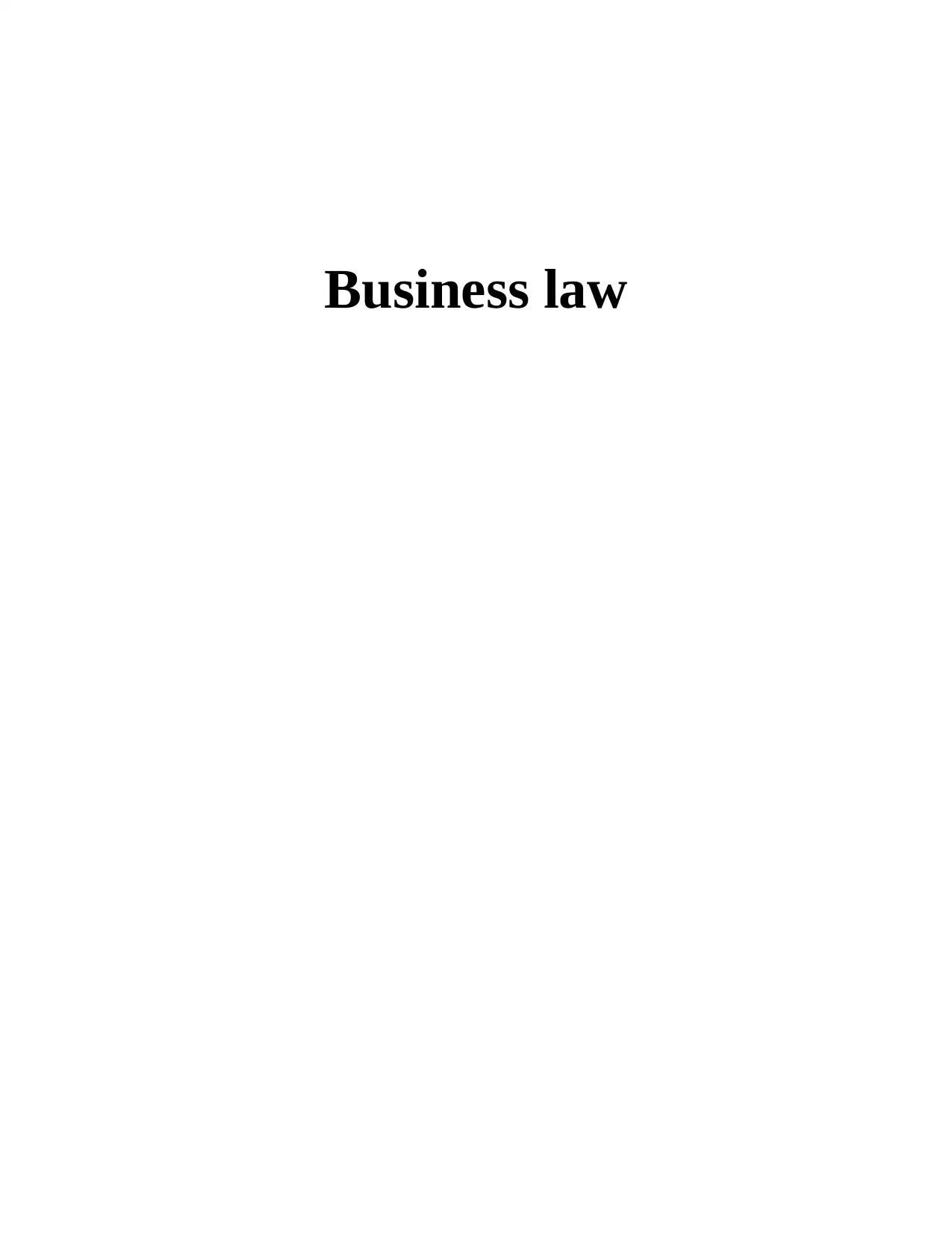
Business law
Paraphrase This Document
Need a fresh take? Get an instant paraphrase of this document with our AI Paraphraser
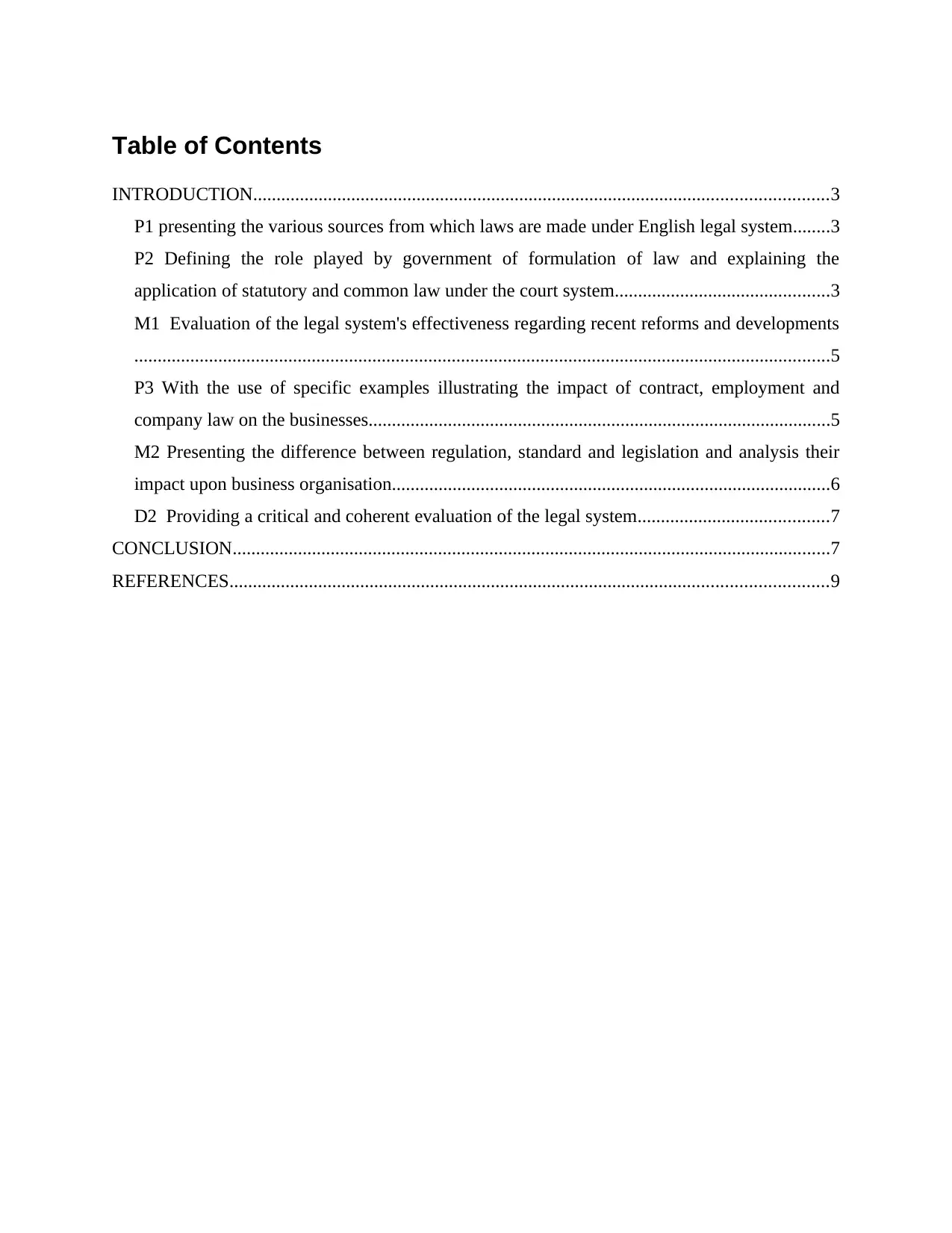
Table of Contents
INTRODUCTION...........................................................................................................................3
P1 presenting the various sources from which laws are made under English legal system........3
P2 Defining the role played by government of formulation of law and explaining the
application of statutory and common law under the court system..............................................3
M1 Evaluation of the legal system's effectiveness regarding recent reforms and developments
.....................................................................................................................................................5
P3 With the use of specific examples illustrating the impact of contract, employment and
company law on the businesses...................................................................................................5
M2 Presenting the difference between regulation, standard and legislation and analysis their
impact upon business organisation..............................................................................................6
D2 Providing a critical and coherent evaluation of the legal system.........................................7
CONCLUSION................................................................................................................................7
REFERENCES................................................................................................................................9
INTRODUCTION...........................................................................................................................3
P1 presenting the various sources from which laws are made under English legal system........3
P2 Defining the role played by government of formulation of law and explaining the
application of statutory and common law under the court system..............................................3
M1 Evaluation of the legal system's effectiveness regarding recent reforms and developments
.....................................................................................................................................................5
P3 With the use of specific examples illustrating the impact of contract, employment and
company law on the businesses...................................................................................................5
M2 Presenting the difference between regulation, standard and legislation and analysis their
impact upon business organisation..............................................................................................6
D2 Providing a critical and coherent evaluation of the legal system.........................................7
CONCLUSION................................................................................................................................7
REFERENCES................................................................................................................................9
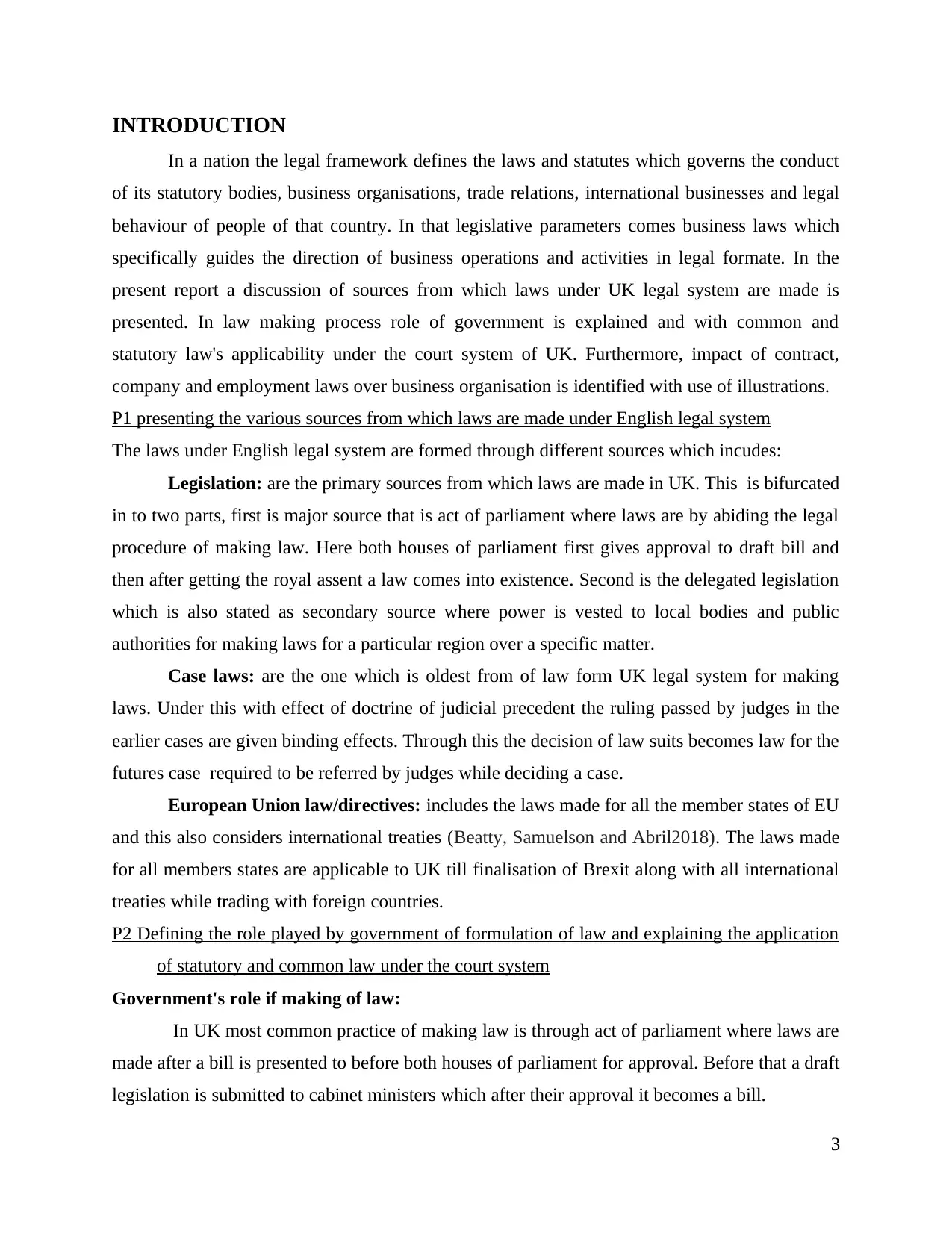
INTRODUCTION
In a nation the legal framework defines the laws and statutes which governs the conduct
of its statutory bodies, business organisations, trade relations, international businesses and legal
behaviour of people of that country. In that legislative parameters comes business laws which
specifically guides the direction of business operations and activities in legal formate. In the
present report a discussion of sources from which laws under UK legal system are made is
presented. In law making process role of government is explained and with common and
statutory law's applicability under the court system of UK. Furthermore, impact of contract,
company and employment laws over business organisation is identified with use of illustrations.
P1 presenting the various sources from which laws are made under English legal system
The laws under English legal system are formed through different sources which incudes:
Legislation: are the primary sources from which laws are made in UK. This is bifurcated
in to two parts, first is major source that is act of parliament where laws are by abiding the legal
procedure of making law. Here both houses of parliament first gives approval to draft bill and
then after getting the royal assent a law comes into existence. Second is the delegated legislation
which is also stated as secondary source where power is vested to local bodies and public
authorities for making laws for a particular region over a specific matter.
Case laws: are the one which is oldest from of law form UK legal system for making
laws. Under this with effect of doctrine of judicial precedent the ruling passed by judges in the
earlier cases are given binding effects. Through this the decision of law suits becomes law for the
futures case required to be referred by judges while deciding a case.
European Union law/directives: includes the laws made for all the member states of EU
and this also considers international treaties (Beatty, Samuelson and Abril2018). The laws made
for all members states are applicable to UK till finalisation of Brexit along with all international
treaties while trading with foreign countries.
P2 Defining the role played by government of formulation of law and explaining the application
of statutory and common law under the court system
Government's role if making of law:
In UK most common practice of making law is through act of parliament where laws are
made after a bill is presented to before both houses of parliament for approval. Before that a draft
legislation is submitted to cabinet ministers which after their approval it becomes a bill.
3
In a nation the legal framework defines the laws and statutes which governs the conduct
of its statutory bodies, business organisations, trade relations, international businesses and legal
behaviour of people of that country. In that legislative parameters comes business laws which
specifically guides the direction of business operations and activities in legal formate. In the
present report a discussion of sources from which laws under UK legal system are made is
presented. In law making process role of government is explained and with common and
statutory law's applicability under the court system of UK. Furthermore, impact of contract,
company and employment laws over business organisation is identified with use of illustrations.
P1 presenting the various sources from which laws are made under English legal system
The laws under English legal system are formed through different sources which incudes:
Legislation: are the primary sources from which laws are made in UK. This is bifurcated
in to two parts, first is major source that is act of parliament where laws are by abiding the legal
procedure of making law. Here both houses of parliament first gives approval to draft bill and
then after getting the royal assent a law comes into existence. Second is the delegated legislation
which is also stated as secondary source where power is vested to local bodies and public
authorities for making laws for a particular region over a specific matter.
Case laws: are the one which is oldest from of law form UK legal system for making
laws. Under this with effect of doctrine of judicial precedent the ruling passed by judges in the
earlier cases are given binding effects. Through this the decision of law suits becomes law for the
futures case required to be referred by judges while deciding a case.
European Union law/directives: includes the laws made for all the member states of EU
and this also considers international treaties (Beatty, Samuelson and Abril2018). The laws made
for all members states are applicable to UK till finalisation of Brexit along with all international
treaties while trading with foreign countries.
P2 Defining the role played by government of formulation of law and explaining the application
of statutory and common law under the court system
Government's role if making of law:
In UK most common practice of making law is through act of parliament where laws are
made after a bill is presented to before both houses of parliament for approval. Before that a draft
legislation is submitted to cabinet ministers which after their approval it becomes a bill.
3
⊘ This is a preview!⊘
Do you want full access?
Subscribe today to unlock all pages.

Trusted by 1+ million students worldwide
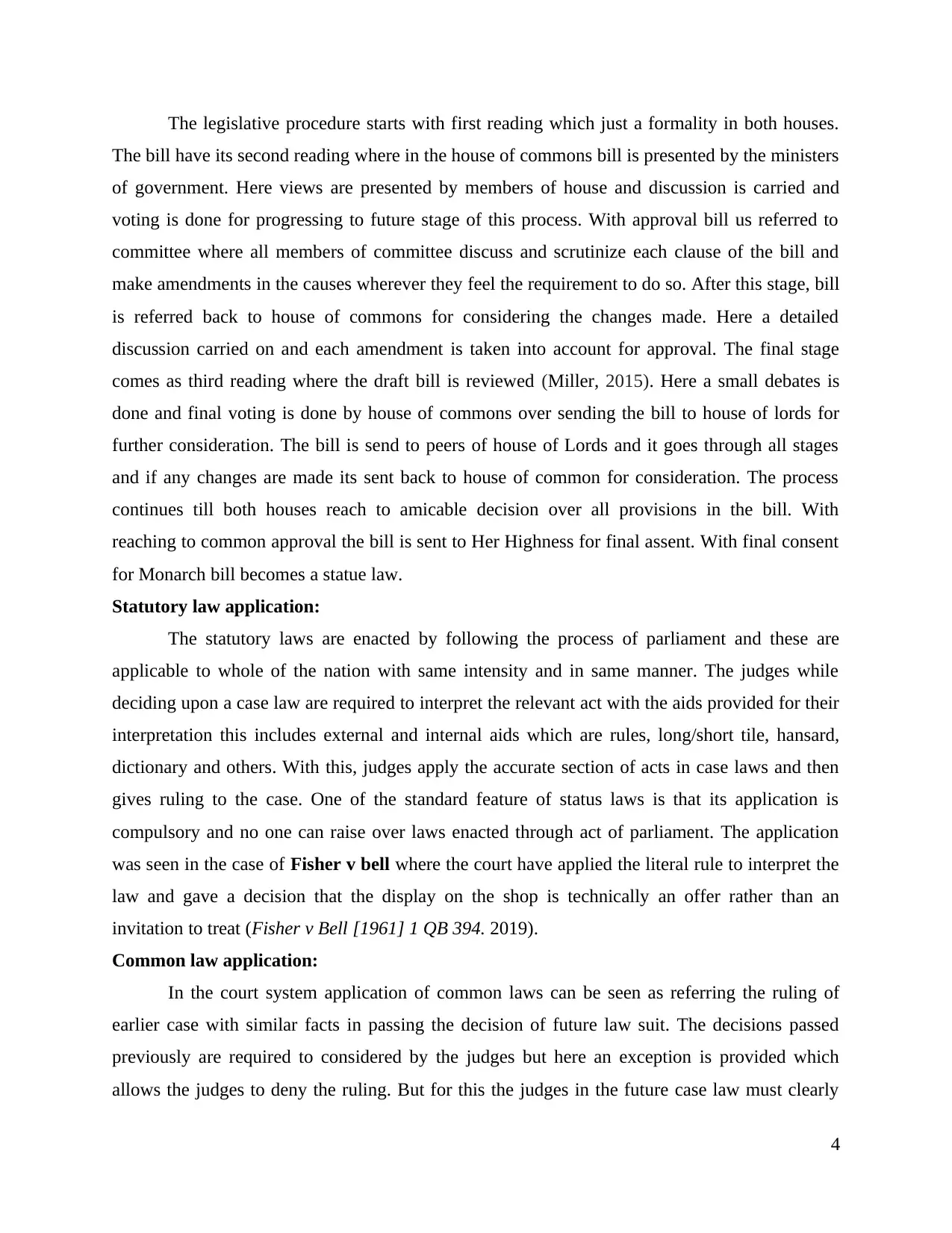
The legislative procedure starts with first reading which just a formality in both houses.
The bill have its second reading where in the house of commons bill is presented by the ministers
of government. Here views are presented by members of house and discussion is carried and
voting is done for progressing to future stage of this process. With approval bill us referred to
committee where all members of committee discuss and scrutinize each clause of the bill and
make amendments in the causes wherever they feel the requirement to do so. After this stage, bill
is referred back to house of commons for considering the changes made. Here a detailed
discussion carried on and each amendment is taken into account for approval. The final stage
comes as third reading where the draft bill is reviewed (Miller, 2015). Here a small debates is
done and final voting is done by house of commons over sending the bill to house of lords for
further consideration. The bill is send to peers of house of Lords and it goes through all stages
and if any changes are made its sent back to house of common for consideration. The process
continues till both houses reach to amicable decision over all provisions in the bill. With
reaching to common approval the bill is sent to Her Highness for final assent. With final consent
for Monarch bill becomes a statue law.
Statutory law application:
The statutory laws are enacted by following the process of parliament and these are
applicable to whole of the nation with same intensity and in same manner. The judges while
deciding upon a case law are required to interpret the relevant act with the aids provided for their
interpretation this includes external and internal aids which are rules, long/short tile, hansard,
dictionary and others. With this, judges apply the accurate section of acts in case laws and then
gives ruling to the case. One of the standard feature of status laws is that its application is
compulsory and no one can raise over laws enacted through act of parliament. The application
was seen in the case of Fisher v bell where the court have applied the literal rule to interpret the
law and gave a decision that the display on the shop is technically an offer rather than an
invitation to treat (Fisher v Bell [1961] 1 QB 394. 2019).
Common law application:
In the court system application of common laws can be seen as referring the ruling of
earlier case with similar facts in passing the decision of future law suit. The decisions passed
previously are required to considered by the judges but here an exception is provided which
allows the judges to deny the ruling. But for this the judges in the future case law must clearly
4
The bill have its second reading where in the house of commons bill is presented by the ministers
of government. Here views are presented by members of house and discussion is carried and
voting is done for progressing to future stage of this process. With approval bill us referred to
committee where all members of committee discuss and scrutinize each clause of the bill and
make amendments in the causes wherever they feel the requirement to do so. After this stage, bill
is referred back to house of commons for considering the changes made. Here a detailed
discussion carried on and each amendment is taken into account for approval. The final stage
comes as third reading where the draft bill is reviewed (Miller, 2015). Here a small debates is
done and final voting is done by house of commons over sending the bill to house of lords for
further consideration. The bill is send to peers of house of Lords and it goes through all stages
and if any changes are made its sent back to house of common for consideration. The process
continues till both houses reach to amicable decision over all provisions in the bill. With
reaching to common approval the bill is sent to Her Highness for final assent. With final consent
for Monarch bill becomes a statue law.
Statutory law application:
The statutory laws are enacted by following the process of parliament and these are
applicable to whole of the nation with same intensity and in same manner. The judges while
deciding upon a case law are required to interpret the relevant act with the aids provided for their
interpretation this includes external and internal aids which are rules, long/short tile, hansard,
dictionary and others. With this, judges apply the accurate section of acts in case laws and then
gives ruling to the case. One of the standard feature of status laws is that its application is
compulsory and no one can raise over laws enacted through act of parliament. The application
was seen in the case of Fisher v bell where the court have applied the literal rule to interpret the
law and gave a decision that the display on the shop is technically an offer rather than an
invitation to treat (Fisher v Bell [1961] 1 QB 394. 2019).
Common law application:
In the court system application of common laws can be seen as referring the ruling of
earlier case with similar facts in passing the decision of future law suit. The decisions passed
previously are required to considered by the judges but here an exception is provided which
allows the judges to deny the ruling. But for this the judges in the future case law must clearly
4
Paraphrase This Document
Need a fresh take? Get an instant paraphrase of this document with our AI Paraphraser
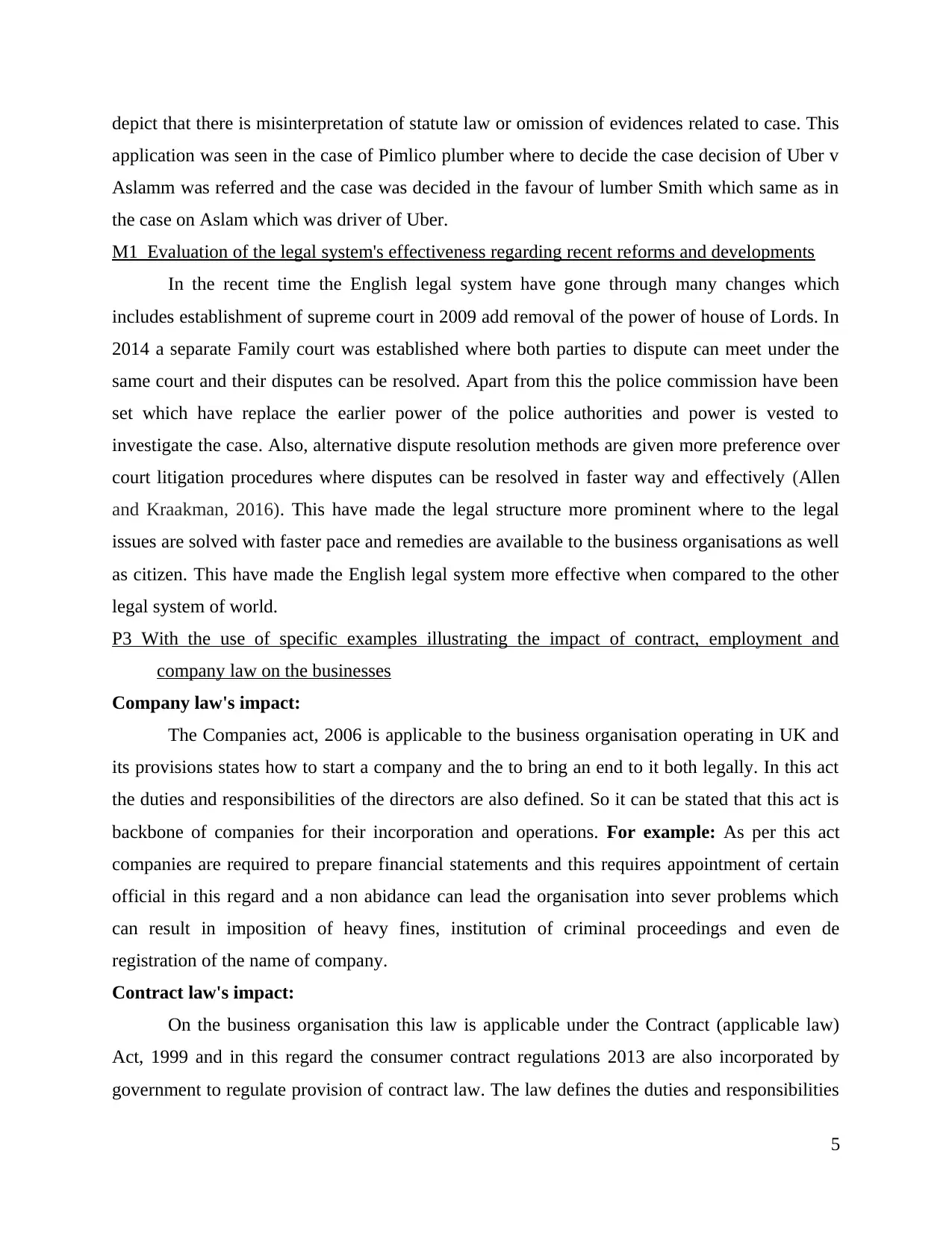
depict that there is misinterpretation of statute law or omission of evidences related to case. This
application was seen in the case of Pimlico plumber where to decide the case decision of Uber v
Aslamm was referred and the case was decided in the favour of lumber Smith which same as in
the case on Aslam which was driver of Uber.
M1 Evaluation of the legal system's effectiveness regarding recent reforms and developments
In the recent time the English legal system have gone through many changes which
includes establishment of supreme court in 2009 add removal of the power of house of Lords. In
2014 a separate Family court was established where both parties to dispute can meet under the
same court and their disputes can be resolved. Apart from this the police commission have been
set which have replace the earlier power of the police authorities and power is vested to
investigate the case. Also, alternative dispute resolution methods are given more preference over
court litigation procedures where disputes can be resolved in faster way and effectively (Allen
and Kraakman, 2016). This have made the legal structure more prominent where to the legal
issues are solved with faster pace and remedies are available to the business organisations as well
as citizen. This have made the English legal system more effective when compared to the other
legal system of world.
P3 With the use of specific examples illustrating the impact of contract, employment and
company law on the businesses
Company law's impact:
The Companies act, 2006 is applicable to the business organisation operating in UK and
its provisions states how to start a company and the to bring an end to it both legally. In this act
the duties and responsibilities of the directors are also defined. So it can be stated that this act is
backbone of companies for their incorporation and operations. For example: As per this act
companies are required to prepare financial statements and this requires appointment of certain
official in this regard and a non abidance can lead the organisation into sever problems which
can result in imposition of heavy fines, institution of criminal proceedings and even de
registration of the name of company.
Contract law's impact:
On the business organisation this law is applicable under the Contract (applicable law)
Act, 1999 and in this regard the consumer contract regulations 2013 are also incorporated by
government to regulate provision of contract law. The law defines the duties and responsibilities
5
application was seen in the case of Pimlico plumber where to decide the case decision of Uber v
Aslamm was referred and the case was decided in the favour of lumber Smith which same as in
the case on Aslam which was driver of Uber.
M1 Evaluation of the legal system's effectiveness regarding recent reforms and developments
In the recent time the English legal system have gone through many changes which
includes establishment of supreme court in 2009 add removal of the power of house of Lords. In
2014 a separate Family court was established where both parties to dispute can meet under the
same court and their disputes can be resolved. Apart from this the police commission have been
set which have replace the earlier power of the police authorities and power is vested to
investigate the case. Also, alternative dispute resolution methods are given more preference over
court litigation procedures where disputes can be resolved in faster way and effectively (Allen
and Kraakman, 2016). This have made the legal structure more prominent where to the legal
issues are solved with faster pace and remedies are available to the business organisations as well
as citizen. This have made the English legal system more effective when compared to the other
legal system of world.
P3 With the use of specific examples illustrating the impact of contract, employment and
company law on the businesses
Company law's impact:
The Companies act, 2006 is applicable to the business organisation operating in UK and
its provisions states how to start a company and the to bring an end to it both legally. In this act
the duties and responsibilities of the directors are also defined. So it can be stated that this act is
backbone of companies for their incorporation and operations. For example: As per this act
companies are required to prepare financial statements and this requires appointment of certain
official in this regard and a non abidance can lead the organisation into sever problems which
can result in imposition of heavy fines, institution of criminal proceedings and even de
registration of the name of company.
Contract law's impact:
On the business organisation this law is applicable under the Contract (applicable law)
Act, 1999 and in this regard the consumer contract regulations 2013 are also incorporated by
government to regulate provision of contract law. The law defines the duties and responsibilities
5
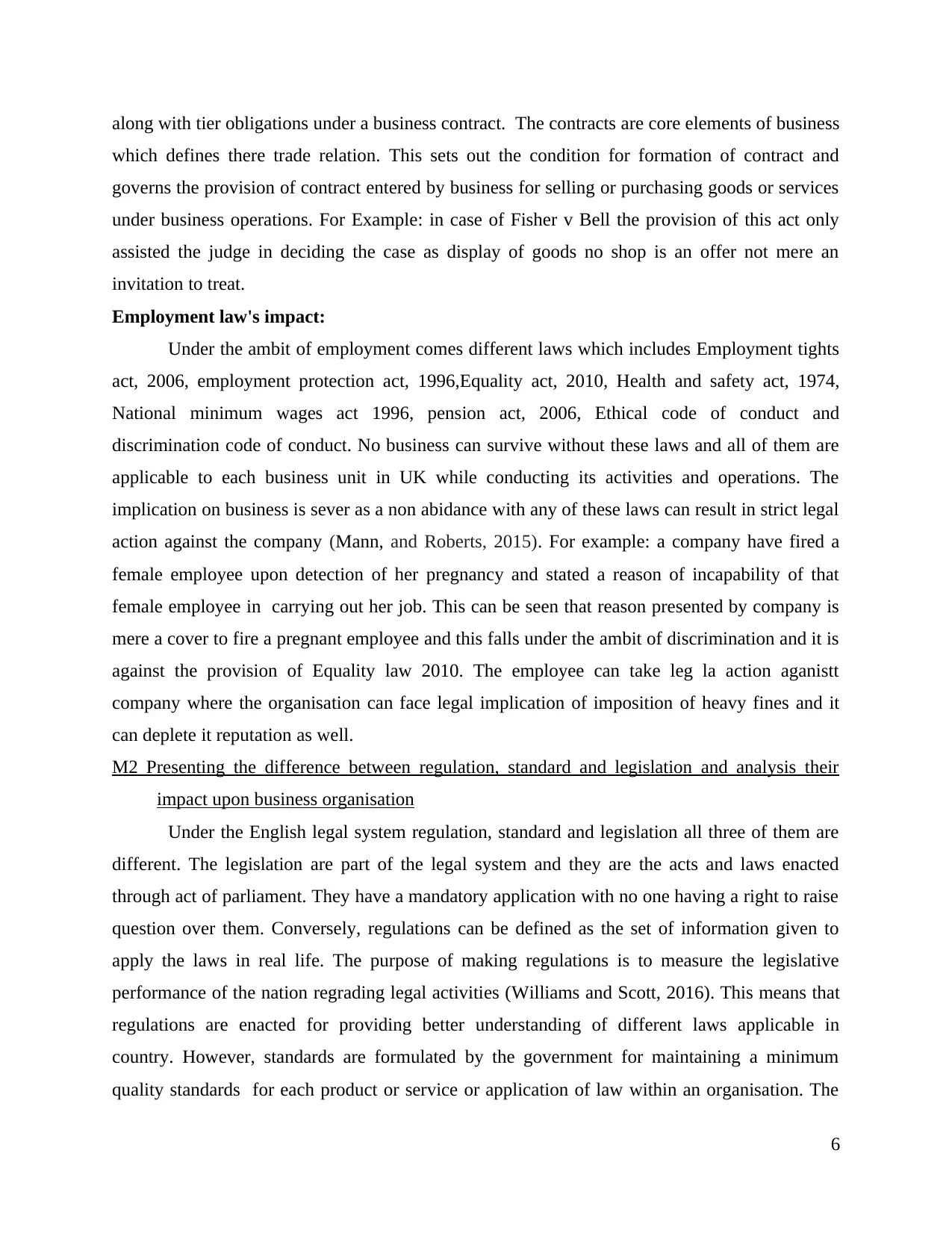
along with tier obligations under a business contract. The contracts are core elements of business
which defines there trade relation. This sets out the condition for formation of contract and
governs the provision of contract entered by business for selling or purchasing goods or services
under business operations. For Example: in case of Fisher v Bell the provision of this act only
assisted the judge in deciding the case as display of goods no shop is an offer not mere an
invitation to treat.
Employment law's impact:
Under the ambit of employment comes different laws which includes Employment tights
act, 2006, employment protection act, 1996,Equality act, 2010, Health and safety act, 1974,
National minimum wages act 1996, pension act, 2006, Ethical code of conduct and
discrimination code of conduct. No business can survive without these laws and all of them are
applicable to each business unit in UK while conducting its activities and operations. The
implication on business is sever as a non abidance with any of these laws can result in strict legal
action against the company (Mann, and Roberts, 2015). For example: a company have fired a
female employee upon detection of her pregnancy and stated a reason of incapability of that
female employee in carrying out her job. This can be seen that reason presented by company is
mere a cover to fire a pregnant employee and this falls under the ambit of discrimination and it is
against the provision of Equality law 2010. The employee can take leg la action aganistt
company where the organisation can face legal implication of imposition of heavy fines and it
can deplete it reputation as well.
M2 Presenting the difference between regulation, standard and legislation and analysis their
impact upon business organisation
Under the English legal system regulation, standard and legislation all three of them are
different. The legislation are part of the legal system and they are the acts and laws enacted
through act of parliament. They have a mandatory application with no one having a right to raise
question over them. Conversely, regulations can be defined as the set of information given to
apply the laws in real life. The purpose of making regulations is to measure the legislative
performance of the nation regrading legal activities (Williams and Scott, 2016). This means that
regulations are enacted for providing better understanding of different laws applicable in
country. However, standards are formulated by the government for maintaining a minimum
quality standards for each product or service or application of law within an organisation. The
6
which defines there trade relation. This sets out the condition for formation of contract and
governs the provision of contract entered by business for selling or purchasing goods or services
under business operations. For Example: in case of Fisher v Bell the provision of this act only
assisted the judge in deciding the case as display of goods no shop is an offer not mere an
invitation to treat.
Employment law's impact:
Under the ambit of employment comes different laws which includes Employment tights
act, 2006, employment protection act, 1996,Equality act, 2010, Health and safety act, 1974,
National minimum wages act 1996, pension act, 2006, Ethical code of conduct and
discrimination code of conduct. No business can survive without these laws and all of them are
applicable to each business unit in UK while conducting its activities and operations. The
implication on business is sever as a non abidance with any of these laws can result in strict legal
action against the company (Mann, and Roberts, 2015). For example: a company have fired a
female employee upon detection of her pregnancy and stated a reason of incapability of that
female employee in carrying out her job. This can be seen that reason presented by company is
mere a cover to fire a pregnant employee and this falls under the ambit of discrimination and it is
against the provision of Equality law 2010. The employee can take leg la action aganistt
company where the organisation can face legal implication of imposition of heavy fines and it
can deplete it reputation as well.
M2 Presenting the difference between regulation, standard and legislation and analysis their
impact upon business organisation
Under the English legal system regulation, standard and legislation all three of them are
different. The legislation are part of the legal system and they are the acts and laws enacted
through act of parliament. They have a mandatory application with no one having a right to raise
question over them. Conversely, regulations can be defined as the set of information given to
apply the laws in real life. The purpose of making regulations is to measure the legislative
performance of the nation regrading legal activities (Williams and Scott, 2016). This means that
regulations are enacted for providing better understanding of different laws applicable in
country. However, standards are formulated by the government for maintaining a minimum
quality standards for each product or service or application of law within an organisation. The
6
⊘ This is a preview!⊘
Do you want full access?
Subscribe today to unlock all pages.

Trusted by 1+ million students worldwide
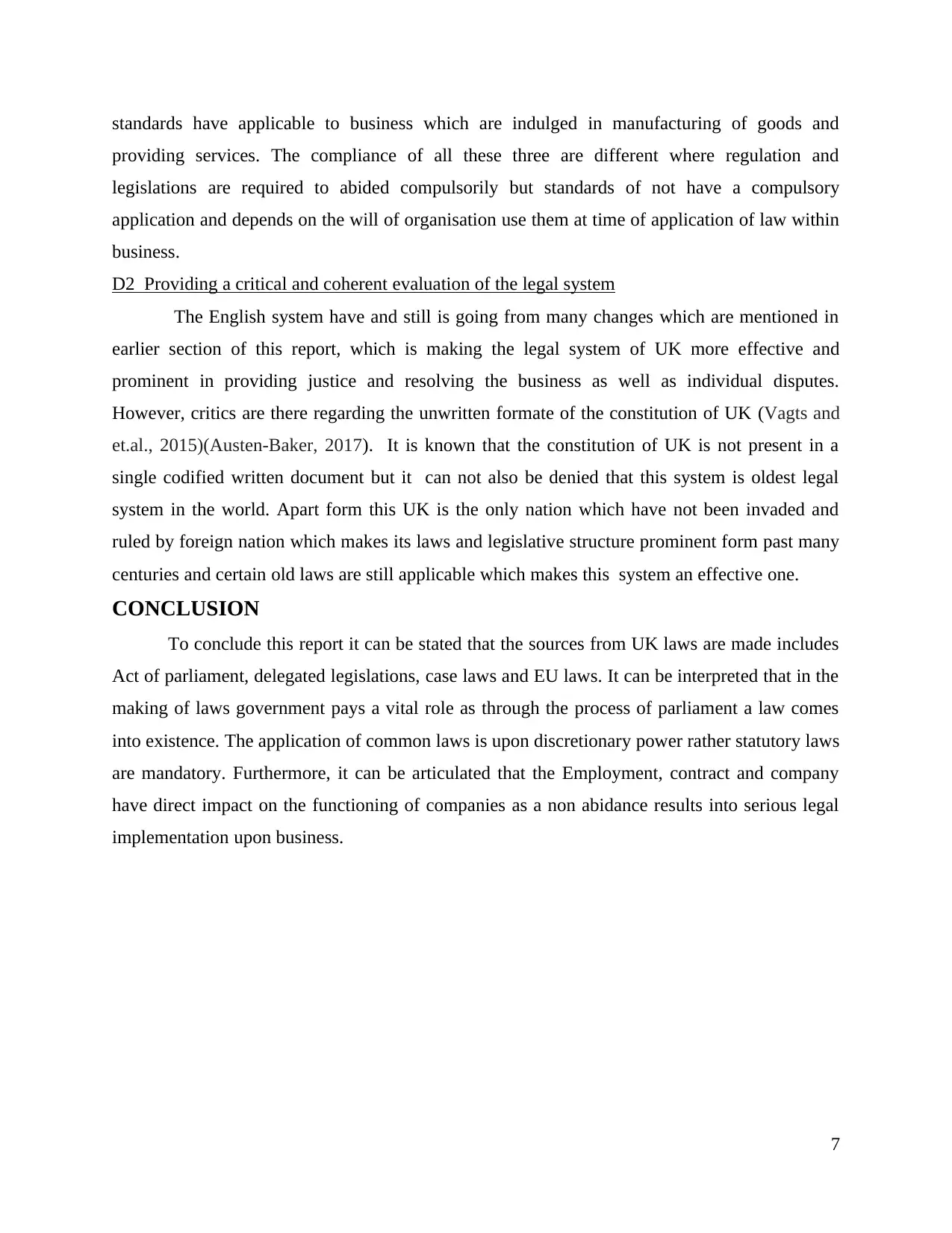
standards have applicable to business which are indulged in manufacturing of goods and
providing services. The compliance of all these three are different where regulation and
legislations are required to abided compulsorily but standards of not have a compulsory
application and depends on the will of organisation use them at time of application of law within
business.
D2 Providing a critical and coherent evaluation of the legal system
The English system have and still is going from many changes which are mentioned in
earlier section of this report, which is making the legal system of UK more effective and
prominent in providing justice and resolving the business as well as individual disputes.
However, critics are there regarding the unwritten formate of the constitution of UK (Vagts and
et.al., 2015)(Austen-Baker, 2017). It is known that the constitution of UK is not present in a
single codified written document but it can not also be denied that this system is oldest legal
system in the world. Apart form this UK is the only nation which have not been invaded and
ruled by foreign nation which makes its laws and legislative structure prominent form past many
centuries and certain old laws are still applicable which makes this system an effective one.
CONCLUSION
To conclude this report it can be stated that the sources from UK laws are made includes
Act of parliament, delegated legislations, case laws and EU laws. It can be interpreted that in the
making of laws government pays a vital role as through the process of parliament a law comes
into existence. The application of common laws is upon discretionary power rather statutory laws
are mandatory. Furthermore, it can be articulated that the Employment, contract and company
have direct impact on the functioning of companies as a non abidance results into serious legal
implementation upon business.
7
providing services. The compliance of all these three are different where regulation and
legislations are required to abided compulsorily but standards of not have a compulsory
application and depends on the will of organisation use them at time of application of law within
business.
D2 Providing a critical and coherent evaluation of the legal system
The English system have and still is going from many changes which are mentioned in
earlier section of this report, which is making the legal system of UK more effective and
prominent in providing justice and resolving the business as well as individual disputes.
However, critics are there regarding the unwritten formate of the constitution of UK (Vagts and
et.al., 2015)(Austen-Baker, 2017). It is known that the constitution of UK is not present in a
single codified written document but it can not also be denied that this system is oldest legal
system in the world. Apart form this UK is the only nation which have not been invaded and
ruled by foreign nation which makes its laws and legislative structure prominent form past many
centuries and certain old laws are still applicable which makes this system an effective one.
CONCLUSION
To conclude this report it can be stated that the sources from UK laws are made includes
Act of parliament, delegated legislations, case laws and EU laws. It can be interpreted that in the
making of laws government pays a vital role as through the process of parliament a law comes
into existence. The application of common laws is upon discretionary power rather statutory laws
are mandatory. Furthermore, it can be articulated that the Employment, contract and company
have direct impact on the functioning of companies as a non abidance results into serious legal
implementation upon business.
7
Paraphrase This Document
Need a fresh take? Get an instant paraphrase of this document with our AI Paraphraser
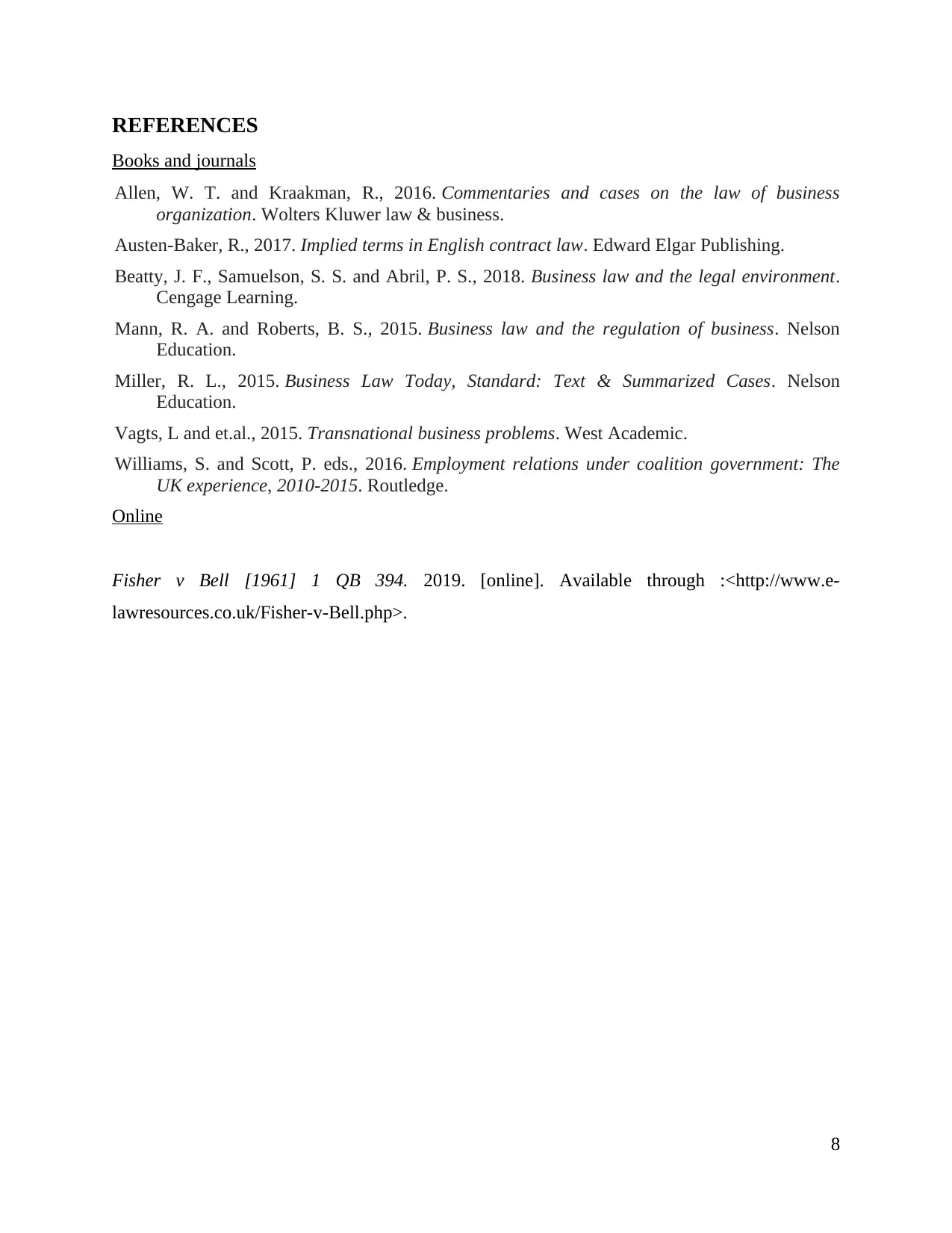
REFERENCES
Books and journals
Allen, W. T. and Kraakman, R., 2016. Commentaries and cases on the law of business
organization. Wolters Kluwer law & business.
Austen-Baker, R., 2017. Implied terms in English contract law. Edward Elgar Publishing.
Beatty, J. F., Samuelson, S. S. and Abril, P. S., 2018. Business law and the legal environment.
Cengage Learning.
Mann, R. A. and Roberts, B. S., 2015. Business law and the regulation of business. Nelson
Education.
Miller, R. L., 2015. Business Law Today, Standard: Text & Summarized Cases. Nelson
Education.
Vagts, L and et.al., 2015. Transnational business problems. West Academic.
Williams, S. and Scott, P. eds., 2016. Employment relations under coalition government: The
UK experience, 2010-2015. Routledge.
Online
Fisher v Bell [1961] 1 QB 394. 2019. [online]. Available through :<http://www.e-
lawresources.co.uk/Fisher-v-Bell.php>.
8
Books and journals
Allen, W. T. and Kraakman, R., 2016. Commentaries and cases on the law of business
organization. Wolters Kluwer law & business.
Austen-Baker, R., 2017. Implied terms in English contract law. Edward Elgar Publishing.
Beatty, J. F., Samuelson, S. S. and Abril, P. S., 2018. Business law and the legal environment.
Cengage Learning.
Mann, R. A. and Roberts, B. S., 2015. Business law and the regulation of business. Nelson
Education.
Miller, R. L., 2015. Business Law Today, Standard: Text & Summarized Cases. Nelson
Education.
Vagts, L and et.al., 2015. Transnational business problems. West Academic.
Williams, S. and Scott, P. eds., 2016. Employment relations under coalition government: The
UK experience, 2010-2015. Routledge.
Online
Fisher v Bell [1961] 1 QB 394. 2019. [online]. Available through :<http://www.e-
lawresources.co.uk/Fisher-v-Bell.php>.
8
1 out of 8
Related Documents
Your All-in-One AI-Powered Toolkit for Academic Success.
+13062052269
info@desklib.com
Available 24*7 on WhatsApp / Email
![[object Object]](/_next/static/media/star-bottom.7253800d.svg)
Unlock your academic potential
Copyright © 2020–2026 A2Z Services. All Rights Reserved. Developed and managed by ZUCOL.





